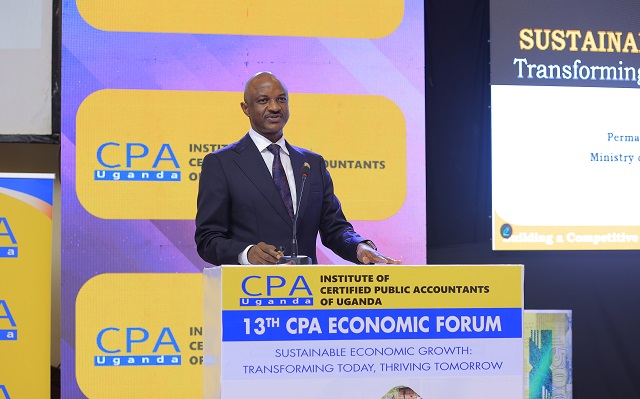At the serene shores of Lake Victoria, during the 13th CPA Economic Forum in Entebbe, Uganda’s Treasury Secretary Ramathan Ggoobi stood not only as a government official but as a storyteller of Uganda’s unfolding journey—a journey of challenges, resilience, and bold ambitions.
Held under the theme of economic transformation, the forum (July 9–11) brought together a diverse group: tech innovators, farmers, economists, civil servants, and business leaders. They were united by one mission—defining the future of Uganda.
“The Future Must Be Built”, in his keynote speech, Ggoobi made it clear: Uganda’s economic future is not guaranteed—it must be earned. He celebrated Uganda’s achievement of meeting UN criteria for graduation from the Least Developed Countries (LDC) category. But he stressed that true transformation lies ahead, not behind.
“Uganda is ready, but not yet transformed. Now is the time for discipline, innovation, and unity,” Ggoobi said.
He challenged both government and citizens to reject complacency and build a more inclusive economy—one that adds value, empowers people, and delivers dignity.
From Digital Highways to Real Productivity
Tech leaders like Michael Niyitegeka (Refactory) raised a tough question: “We’ve built digital infrastructure, but what are we transporting on it?”
Ggoobi agreed: internet access alone won’t grow the economy. What matters is how Ugandans use that access—to create jobs, improve services, and boost productivity.
Dr. Hatwib Mugasa of NITA-U echoed this, urging investment in digital skills and system integration. Technology, he noted, is only as powerful as the people who use it.
Reforming the Tax System
CPA Muhammed Ssempijja from Ernst & Young proposed tax reforms to encourage compliance and fairness—such as lowering top income tax rates and simplifying VAT for small businesses.
Ggoobi welcomed these ideas, saying taxation should not feel like punishment.
“If people trust the system and see real public value, they will pay taxes willingly,” he said.
Uganda’s Real Wealth: What We Make, Not What We Dig, Uganda earns just $51 per person per year from agriculture—a shocking figure, Ggoobi noted. That’s why he’s pushing for industrialisation and value addition. Whether in maize, lithium, or coffee, he said, raw exports must be turned into refined goods that create jobs and grow incomes.
Housing and Urban Crisis
With rapid urbanisation, Ggoobi emphasized that many families can’t afford decent housing. He called for affordable housing, urban planning, and infrastructure investment—not just to support growth, but to ensure it’s shared.
Revenue Still Lags
Charles Mua from the Uganda Revenue Authority pointed out that Uganda’s tax-to-GDP ratio remains low, weighed down by informality and exemptions. Ggoobi responded with urgency: reaching the Vision 2040 goal of becoming a $500 billion economy will require bold reforms and sustainable domestic financing.
Forum of Voices, Not Just Speeches
This year’s CPA Forum was not a one-man show. Leaders from NSSF, UNOC, UEGCL, Electoral Commission, Bank of Uganda, Stanbic Bank, Centenary Bank, and MTN Uganda joined the dialogue.
They discussed everything from energy investments and financial inclusion to electoral reform and youth employment—painting a full picture of Uganda’s development puzzle.
Ggoobi’s Final Word: The Power Lies in the People
Closing the forum, Ggoobi called on every Ugandan to take part in shaping the country’s destiny.
“This country’s future won’t fall from the sky. We must build it—together,” he said. “Not just by policy, but by character: hard work, discipline, and belief in our collective potential.”
Ggoobi said that, Uganda has made progress, but still has a long way to go. The country needs to, Add value to what it produces instead of exporting raw materials, Make taxes fairer so people willingly contribute, Use technology wisely, not just build it, Fix housing and infrastructure challenges and Train its people for future jobs.
Ramathan Ggoobi’s message was clear: Uganda’s future will not be inherited—it must be built by all Ugandans.



